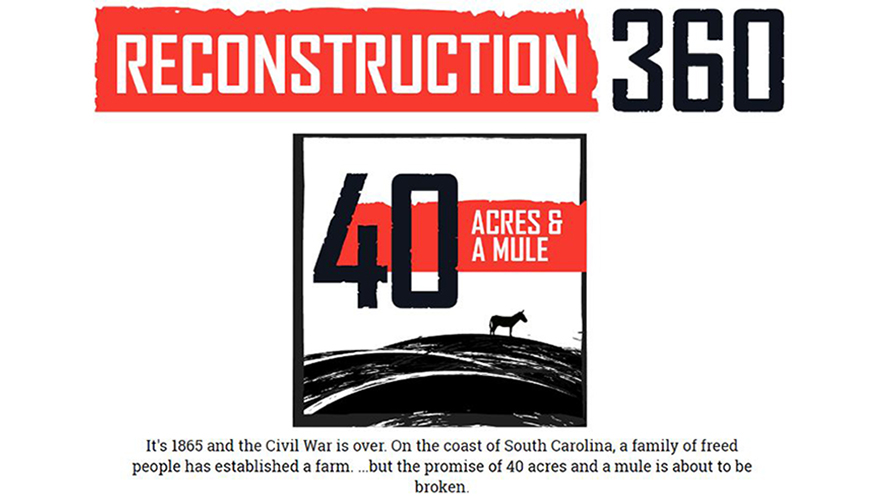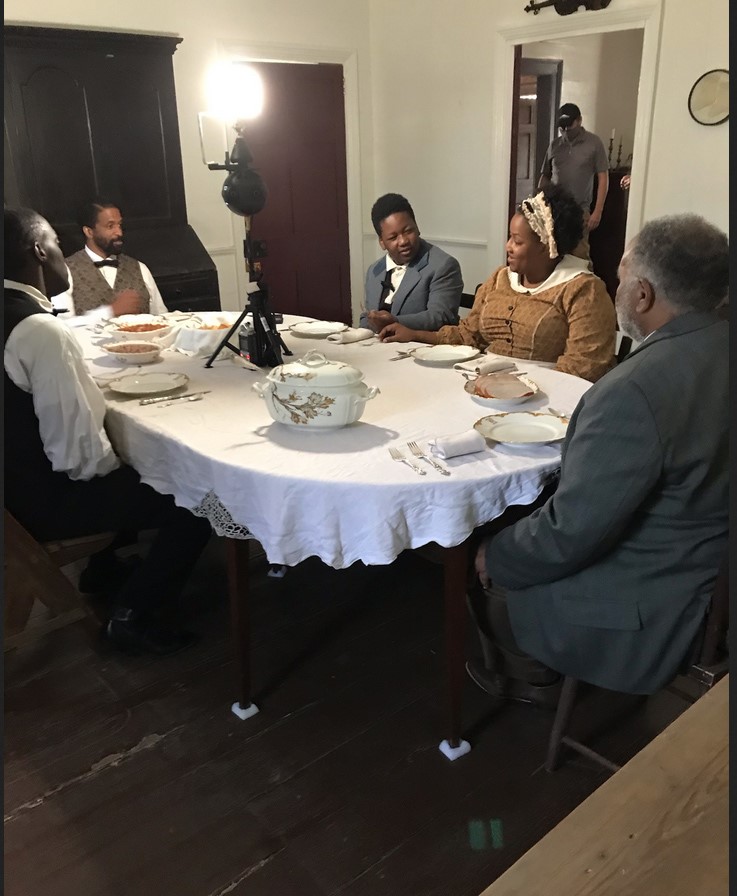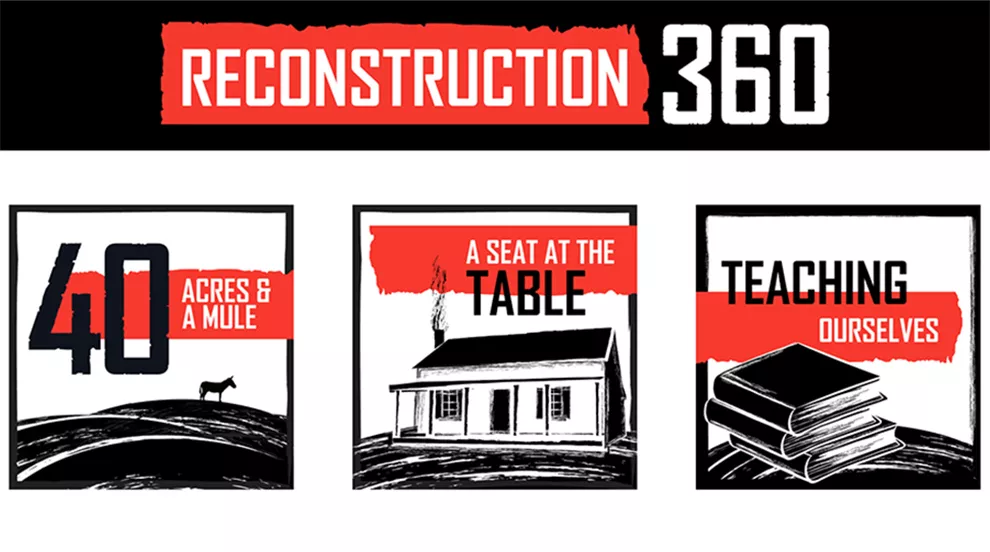
Violence and Hatred - Fourth Module of Reconstruction 360
Reconstruction 360 features 360-degree interactive video and short documentaries, and includes lesson plans, primary documents, curriculum standards and a geolocative walking tour of Reconstruction sites in downtown Columbia, S.C.
Description:
In May 1866, a terrible event known as the Memphis Massacre occurs, where at least 46 Black Memphians were murdered by members of a white mob. Terror is raging outside the home of a Black family in Memphis. The father has been wounded and the family is preparing to flee. Many southern whites viewed the changes brought about by Reconstruction as a threat to the status-quo, and refused to accept or adhere to progress.
Aspects of the theme explored in this module through clickable objects and characters include the presidency of Ulysses S. Grant, the growing Irish population in Memphis, the increase in violence and necessary intervention by the U.S. Army, and the consequences of the Memphis Massacre.
Visit the Reconstruction 360 website here.
The first photo pictured above shows Patrick Hayes setting up the 360 camera on the set.
The vignette for the Violence and Hatred module, which depicts a family struggling to flee the Memphis Massacre, was shot in a house in downtown Columbia in the summer of 2022. The home was built in the 1880s and is owned by Richard Durlach and Breedlove. Set design and decoration is by Paul Moore. One interesting little factoid is that the sweet potatoes featured in the “Freedpeople in Memphis” video are actually made of clay by the set designer, who is a ceramist.
Actor Sam McWhite in the role of the father, on the set.
Pictured from left to right: Betsy Newman, Director; Sam McWhite, Father; J.B. Marple, U.S. Soldier; Jean Lomasto, Costume Designer; Rayanna Briggs, Daughter; Richard Durlach, Location Owner; Jocelyn Brannon, Mother; Jocelyn Sanders, Sister; Xavier Blake, Producer/Cameraman; and Titus Davis, Producer/Cameraman.
SCETV wishes to give a shout out to interns Eva Chillura and Bonnie Frick. They were a tremendous help with making Reconstruction 360's fourth module a success! In the above photo, the interns assist Xavier Blake taping J.B. Marple.
Reconstruction 360 now features four modules - with more to come! View them all!
40 Acres & a Mule - First Module of Reconstruction 360
Reconstruction 360 is SCETV’s new web and mobile application that brings contemporary scholarship about Reconstruction to a project designed for mobile devices. Intended for the general public, students and educators, Reconstruction 360 uses 360° videos and short documentary films to shed light on the Reconstruction era. The project focuses on the theme of land and labor, specifically unpacking the history of “40 Acres and a Mule,” the short-lived promise of land that was made to freedmen along the coast of South Carolina and Georgia.
Reconstruction 360 takes a close look at the impact on freedpeople of land policies during the early years of Reconstruction. The platform for the app is a 360° reenactment of the moment in 1865 when a freedman and his family are informed by a member of the Freedmen’s Bureau that they do not own the farm they had acquired through General Sherman’s Field Order 15. As the scene plays out, hotspots leading to short videos appear next to the characters. In these videos, on-camera narrators chart the complex history of the promise and heartbreak of “40 Acres and a Mule,” including the role of the Freedmen’s Bureau, President Johnson’s pardons of Confederates, and the agency of freedpeople in shaping their own destiny after the Civil War. Other topics covered include the Black Codes, the role of women and children, the development of public education, and the evolution of sharecropping.
In other videos on the site, historians help to place the stories in the historical, social and geographic context, while interviews with descendants document personal connections to the past.
Geolocative maps guide users on a tour through Reconstruction landmarks in Columbia, South Carolina. Taken together, these elements create a history resource that is accessible, portable and appealing, making immersive mobile-first experiences widely available to a global audience on tablets and smartphones.

A Seat at the Table - Second Module of Reconstruction 360
You are invited to dinner in Savannah in 1868. The mother of a Black family has prepared a special meal to commemorate the new Georgia State Constitution that her husband and pastor have helped to create. This module, A Seat at the Table, focuses on the theme of institution building, with a focus on the institution of family.

Photographed during a shoot of "A Seat at the Table." Savannah family seated around the table - from a production shot showing 360 camera in the middle of the table.

Teaching Ourselves - Third Module of Reconstruction 360
In a region which had the highest rate of illiteracy, black and white, before the Civil War, the power of education was incalculable. Across the South, it had been a crime to teach the enslaved to read. During Reconstruction, Northern missionary societies, the Freedmen’s Bureau and other supporters helped raise money to support teachers and build schools for freedpeople, but the formerly enslaved understood the power of literacy and led the effort to educate themselves. The Reconstruction governments elected after the enfranchisement of black men founded more than 3,000 schools. Freedpeople, even the poorest, held fundraisers to pay teachers, and donated land and labor to build schools. W.E.B. DuBois declared that the development of black educators, “crowns the work of Reconstruction.”
Aspects of the theme explored in this module through clickable objects and characters include the presidency of Abraham Lincoln, schoolbooks and buildings, the education of black teachers, the role of the Freedmen’s Bureau in black education, and the role of missionary societies in founding schools for blacks.
Reconstruction 360 is a project of South Carolina ETV, and is funded by the National Endowment for the Humanities.